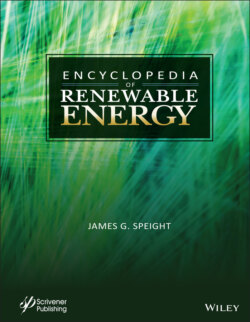Читать книгу Encyclopedia of Renewable Energy - James Speight G., James G. Speight - Страница 254
Briquette Binder
ОглавлениеThe binder used for coal briquetting has considerable influence of the properties of the finished product. Coke-oven tar (or the solid pitch) has been, and continues to be, widely used as a binder in the production of briquettes from bituminous coal, although crude oil-derived products are also being used.
The composition of bituminous coal tar and pitch is complex and consists of a wide variety of components. The coke-forming components of the pitch are of great importance for briquetting, and pitch from low-volatile coal (such as anthracite) has been preferred. These coals do not cake or melt while burning in the furnace; thus, the stability of the briquettes depends entirely on the skeleton of pitch coke formed in the briquette structure. Furthermore, the content of coke-forming components in the tar pitch increases as the rate of pitch distillation is decreased.
Pitch viscosity also exerts a strong influence on the process as do the coal-binder interactions. During the briquetting process, the properties of the binder pitch are changed by heat, duration of the process, air, and steam. These factors can change pitch composition in the thin layer present in the heated briquetting matrix.
Crude oil residua used in the briquetting of coals have often been given the collective name asphalt (bitumen in Europe and many other countries). The most important data used to characterize such asphalt is the softening point, the penetration, the Conradson carbon residue, and the plasticity range which indicate the thermoplastic character of the binder and content of coke-forming components.
These two properties are considerably different in asphalt and coal-tar pitch. Crude oil-derived materials have a lower content of coke-forming components than coal-tar pitch, and this may be a disadvantage when crude oil-derived materials are used as binders for noncaking coal briquettes. Use of crude oil-derived materials having a lower than-desirable propensity for coke formation, as indicated by a low Conradson carbon residue, produces briquettes that have a low stability during firing.
Propane asphalt (produced in a crude oil refinery) has a lower penetration value than asphalts obtained by distillation or by oxidation. Propane asphalt has a relatively high temperature sensitivity which may cause the briquettes to adhere more efficiently. It is possible to alter the temperature sensitivity of the propane asphalt by the conventional methods of treatment which are used to alter asphalt properties for highway use.
Sulfite liquor is a by-product obtained during the treatment of wood with sulfites (calcium, sodium, magnesium, and ammonium) to produce cellulose. The liquor has significant adhesion properties thereby fulfilling one of the binder requirements for use as a briquette binder.
The sulfite liquor and the sulfite pitch remaining after water removal are water soluble. Briquettes made with sulfite liquor as the binder can be rendered water-resistant (referred to as hardening the briquette) by heating to 220 to 350°C (430 to 660°F).
Slightly sintering or lightly caking coals can be briquetted with calcium sulfite liquor or with magnesium or sodium sulfite liquor as a binder. Briquettes that are stable during firing can be made from anthracite coals only when using ammonium sulfite liquor. This low-ash binder produces a favorable coke skeleton in the briquette structure during combustion.
Starch has a substantial adhesive power, and 1 to 3% w/w starch added to the coal, as a solid or in a suspension, can be used as a binder for the production of coal briquettes. Starch is used in the manufacture of charcoal briquettes, which are used in increasing amounts as barbeque briquettes.
See also: Briquette, Briquette Manufacture.
